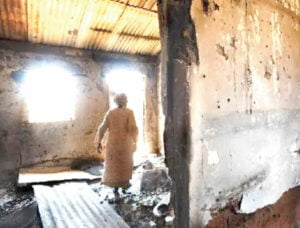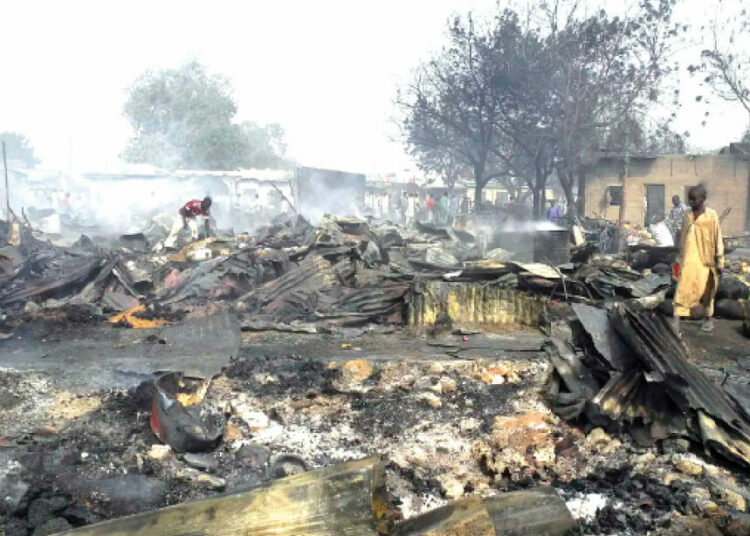The call to prayer had just pierced the silence of dawn in Gidan Mantau, a quiet farming village nestled in Karfi Ward. But before the final Ameen could fade from the mosque walls, the stillness was shattered—gunfire tore through the air, turning reverence into chaos
By sunrise, Gidan Mantau was no longer a village but a graveyard of dreams. More than 50 souls were lost—fathers who never returned, mothers who died shielding their children, entire families wiped out in moments of terror. Smoke clung to the air as grief clung to the survivors. What had been a close-knit community now lay broken, its streets strewn with ashes, silence, and the unbearable weight of memory.
Survivors, their clothes still singed with smoke, staggered through the wreckage, searching the bushes, calling names that received no answer.
Those who survived speak in whispers, their voices thick with shock. A young boy, barely ten, stared blankly at the ruins of his home, unable to cry. An old woman sat on the remains of her front porch, rocking back and forth, muttering prayers beneath her breath. Everyone lost someone, no one was spared
The attackers, about a hundred in number, struck with chilling precision. First, they stormed the mosque, spraying bullets at worshippers lost in prayer. When the shooting ceased, they fanned out into homes, burning, looting, and dragging women, children, and the elderly into captivity.
Gidan Mantau did not just lose its people that morning, it lost its very soul.
One resident pointed silently to the smoldering ruins of a burnt house and said, “Fifteen people lived here, all gone. They were locked inside and burnt alive. The whole family perished.”
In the aftermath, dozens of families have fled to nearby towns, sleeping in makeshift shelters, clutching the little they managed to escape with. Some are too afraid to return. Others have nowhere else to go. The government’s response has been slow, and the promises of security have become background noise in a region where danger speaks louder.
For three days after the massacre, no rescue team arrived. Villagers, their clothes soaked in sweat and tears, searched the bush paths alone. They found bodies under trees, in farms, and by streams.
This is no longer banditry. This is war,” said Mallam Sani, a teacher who lost his wife and two sons in the attack. His eyes were vacant, his hands trembling as he held onto the only thing he had left, jis daughter, just three years old, too young to understand what had happened, but old enough to notice the silence in their home.
“We buried 55,” a local youth leader said quietly, “but we know there are more. The smell of death is still everywhere.”
This was not an isolated attack. Karfi Ward, where Ungwan Farin Kai and Gidan Mantau lie, has become one of the bloodiest frontlines in Malumfashi’s war with bandits. Residents here speak of funerals as frequently as weddings.
Alhaji Umar Usman, a surviver of the attack at Ungwan Farin Kai, said “They came while we were praying, they killed eighteen people inside the mosque.

“When we counted the bodies, twenty-four had died. Thirteen houses were burned, and fifty people, mostly women and children, were taken away. Only three men survived inside the mosque.”
Hundreds have since fled to neighboring towns, sleeping on classroom floors and half-built houses. Those who remain say they live with only one certainty that the bandits will return.
Else where Na’alma Ward, the are counting their debt. Sixteen communities here have been ravaged by repeated attacks, and nine of them are now locked in negotiations with the bandits.
The Councillor of the ward, Usman A. Usman explained the desperation:“The bandits demanded ten million naira and two Honda motorcycles, altogether close to fifteen million. They told us plainly: if you want to go to your farms, you must pay. Otherwise, stay at home and wait for us.”
The villagers agreed to contribute ₦10,000 per household, hoping it would buy peace. Instead, it bought them deeper humiliation.
“Two villages were attacked the very next day,” phones were snatched, people taken, livestock driven away. Each time they come, they leave with human beings as if they were goats”, he said
In Na’alma, even farming has become a privilege bought with blood and money. The bandits dictate the schedule: villagers may till their land only between 8 a.m. and 1 p.m. After that, they must abandon the fields and lock themselves indoors.
Usman further disclosed that about 16 communities have fled to towns such as Dayi and Malumfashi, abandoning their homes at night for safety and returning only at daybreak to tend their farms briefly.
He identified the bandits’ hideouts as Kankara axis, particularly Wawa Kaza and Gimi, calling for urgent deployment of security forces to the affected areas
“It is like living in prison without walls,” says Malam Sule, a farmer. “They tell us when to farm and when to sleep. We are free only inside the hours they allow. This is not freedom. This is slavery.”
A Massacre Foretold
On the floor of the State Assembly, the lawmaker representing Malumfashi, Hon. Aminu Ibrahim, struggled to hold back tears. “Our people can no longer live in their villages, the situation has become unbearable. These attacks never end”, he cried .
The state government responded with condolences. A high-powered delegation led by Secretary to the State Government, Abdullahi Faskari, visited the affected wards to commiserate. They described the killings as “a painful and huge loss” and promised relief materials.
The delegation, which was received by the District Head of Karfi and relatives of the deceased, pledged government support to the people.
Governor Dikko Radda, who is on medical leave, was said to have contacted Acting Governor Faruk Lawal Jobe, directing him to dispatch a high-powered delegation to console the victims’ families and the affected community.
But in Karfi and Na’alma, the promises feel hollow. “They come, they cry with us, they pray with us,” says one elder bitterly. “Then they leave us to the bandits.”
Katsina is not without soldiers or police. The state hosts the Nigerian Army’s 17 Brigade, several police divisions, and intelligence units. Yet in Na’alma and Karfi, villagers say security forces rarely arrive when needed, and never stay long enough to prevent another strike.
The reasons are familiar: poor access roads, overstretched manpower, and an enemy that disappears into forests after every raid. A retired officer described it bluntly: “This is a war fought with wooden shields. The state is always reacting, never preventing.”
A Life In Half
Every evening, families gather their children and flee to safer towns. They return only in daylight to scratch out a few hours of farm work before retreating again. Children grow up in displacement, their education broken. Markets are empty, barns are bare, hunger deepens.
Across Na’alma and Karfi, one phrase echoes: “We are under the surveliance of bandits.” For the villagers, the men in the forests are the ones who decide who farms, who prays, and who survives.
“The bandits are our government now,” an elder in Karfi says quietly. “They tax us, they guard us, they punish us. Abuja and Katsina only come when we are already dead.”
‘‘The bandits are the ones telling us when to farm, come out, sleep and do other things,’’ another elder said in tears.
Got Mohammed Idris, Karfi Ward, like many others in Katsina State, now lives on borrowed time. People no longer ask when the next attack will come, they ask if they’ll survive it. Farming is done in panic, prayers are said with trembling lips, and nightfall brings not rest, but dread.
As Gidan Mantau mourns its dead, one truth echoes louder than the gunshots that tore it apart: the people have been abandoned to their fate. And until that changes, every dawn may bring not a new day, but another nightmare.
Until real protection is restored,
Malumfashi’s residents will remain trapped between fear and extinction, their villages fading one after another into silence.





